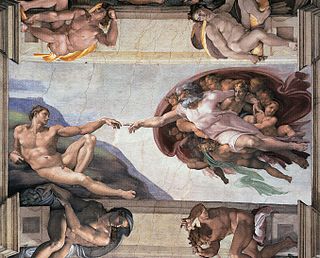
The Bible is a collection of religious texts or scriptures, some, all, or a variant of which, are held to be sacred in Christianity, Judaism, Samaritanism, Islam, Baha'i'ism and many other religions. The Bible is an anthology, a compilation of texts of a variety of forms, originally written in Hebrew, Aramaic, and Koine Greek. These texts include instructions, stories, poetry, and prophecies, and other genres. The collection of materials that are accepted as part of the Bible by a particular religious tradition or community is called a biblical canon. Believers in the Bible generally consider it to be a product of divine inspiration, but the way they understand what that means and interpret the text varies.

The Book of Nehemiah in the Hebrew Bible, largely takes the form of a first-person memoir by Nehemiah, a Jew who is a high official at the Persian court, concerning the rebuilding of the walls of Jerusalem after the Babylonian exile and the dedication of the city and its people to God's laws (Torah).
The Book of Judges is the seventh book of the Hebrew Bible and the Christian Old Testament. In the narrative of the Hebrew Bible, it covers the time between the conquest described in the Book of Joshua and the establishment of a kingdom in the Books of Samuel, during which biblical judges served as temporary leaders.

The Book of Esther, also known in Hebrew as "the Scroll", is a book in the third section of the Hebrew Bible. It is one of the Five Scrolls in the Hebrew Bible and later became part of the Christian Old Testament. The book relates the story of a Jewish woman in Persia, born as Hadassah but known as Esther, who becomes queen of Persia and thwarts a genocide of her people.

David was, according to the Hebrew Bible, the third king of the United Kingdom of Israel. Historians of the Ancient Near East agree that David probably lived c. 1000 BCE, but little more is known about him as a historical figure.

The Torah is the compilation of the first five books of the Hebrew Bible, namely the books of Genesis, Exodus, Leviticus, Numbers and Deuteronomy. The Torah is known as the Pentateuch or the Five Books of Moses by Christians. It is also known as the Written Torah in Jewish tradition. If meant for liturgic purposes, it takes the form of a Torah scroll. If in bound book form, it is called Chumash, and is usually printed with the rabbinic commentaries.

Jeremiah, also called Jeremias or the "weeping prophet", was one of the major prophets of the Hebrew Bible. According to Jewish tradition, Jeremiah authored the Book of Jeremiah, the Books of Kings and the Book of Lamentations, with the assistance and under the editorship of Baruch ben Neriah, his scribe and disciple.

Noah's Ark is the ship in the Genesis flood narrative through which God spares Noah, his family, and examples of all the world's animals from a global deluge. The story in Genesis is based on earlier flood myths originating in Mesopotamia, and is repeated, with variations, in the Quran, where the Ark appears as Safinat Nūḥ and al-fulk.

In the biblical Book of Genesis, Cain and Abel are the first two sons of Adam and Eve. Cain, the firstborn, was a farmer, and his brother Abel was a shepherd. The brothers made sacrifices to God, but God favored Abel's sacrifice instead of Cain's. Cain then murdered Abel, whereupon God punished Cain by condemning him to a life of wandering. Cain then dwelt in the land of Nod, where he built a city and fathered the line of descendants beginning with Enoch.
The Genesis creation narrative is the creation myth of both Judaism and Christianity. The narrative is made up of two stories, roughly equivalent to the first two chapters of the Book of Genesis. In the first, Elohim creates the heavens and the Earth in six days, then rests on, blesses, and sanctifies the seventh. In the second story God creates Adam, the first man, from dust and places him in the Garden of Eden. There he is given dominion over the animals. Eve, the first woman, is created from Adam's rib as his companion.
Robert Bernard Alter is an American professor of Hebrew and comparative literature at the University of California, Berkeley, where he has taught since 1967. He published his translation of the Hebrew Bible in 2018.

Michal was, according to the first Book of Samuel, a princess of the United Kingdom of Israel; the younger daughter of King Saul, she was the first wife of David, who later became king, first of Judah, then of all Israel.
Hebrew Bible English translations are English translations of the Hebrew Bible (Tanakh) according to the Masoretic Text, in the traditional division and order of Torah, Nevi'im, and Ketuvim. Most Jewish translations appear in bilingual editions (Hebrew–English).

In the Hebrew Bible, the coat of many colors or ketonet passim is the name for the garment that Joseph owned; it was given to him by his father Jacob in Vayeshev.

The chronology of the Bible is an elaborate system of lifespans, 'generations', and other means by which the Masoretic Hebrew Bible measures the passage of events from the creation to around 164 BCE. It was theological in intent, not historical in the modern sense, and functions as an implied prophecy whose key lies in the identification of the final event. The passage of time is measured initially by adding the ages of the Patriarchs at the birth of their firstborn sons, later through express statements, and later still by the synchronised reigns of the kings of Israel and Judah.
Phyllis Trible is a feminist biblical scholar from Richmond, Virginia, United States. Trible's scholarship focuses on the Hebrew Bible and she is noted for her prominent influence on feminist biblical interpretation. Trible has written a multitude of books on interpretation of the Hebrew Bible, and has lectured around the world, including the United States, New Zealand, Australia, Japan, Canada, and a number of countries in Europe.

Jacob L. Wright is a biblical scholar currently serving as professor of Hebrew Bible at Emory University. Prior to his Emory appointment, Wright taught at the University of Heidelberg (Germany), one of the foremost research-oriented public universities in Europe, for several years. His areas of expertise include Biblical Archaeology, warfare in the Ancient Near East, and the literary and redaction history of the Hebrew Bible canon. He has published extensively throughout his career, authoring several books and dozens of articles which span topics such as Ezra-Nehemiah, the Persian period, warfare in the Ancient Near East; as well as the material culture of the ancient Levant, the unique role of women in the Hebrew Bible, and larger themes such as defeat, peoplehood, and national identity in the Hebrew Bible. Areas of concentration in war studies include war commemoration, urbicide and ritual violence, and feasting and gift-giving.

Shimon Bar-Efrat (1929–2010) was an Israeli Old Testament scholar. He was Head of Biblical Studies at the Hebrew University Secondary School in Jerusalem, and is best known for his book, Narrative Art in the Bible, in which he "provides a catalogue of literary techniques and devices found in Old Testament narratives." Jeffrey Staley suggests that, along with Robert Alter, Adele Berlin, and Meir Sternberg, Bar-Efrat is a master of "leading the reader through the sudden twists and sharp turns, the steep ridges and dizzying drop-offs that make up the art of ancient Hebrew characterization."

Gary A. Rendsburg is a professor of biblical studies, Hebrew language, and ancient Judaism at Rutgers University in New Brunswick, New Jersey. He holds the rank of Distinguished Professor and serves as the Blanche and Irving Laurie Chair of Jewish History at Rutgers University (2004–present), with positions in the Department of Jewish Studies and the Department of History.
Steven Phillip Weitzman is an American scholar of Jewish studies and religious studies, with interests that include the origins and early history of Judaism and the history of the Bible's reception. He has served as the Ella Darivoff Director of the Herbert D. Katz Center for Advanced Judaic Studies at the University of Pennsylvania since 2014. He is also the Abraham M. Ellis Professor of Semitic Languages and Literatures in the department of Religious Studies at the University of Pennsylvania.














